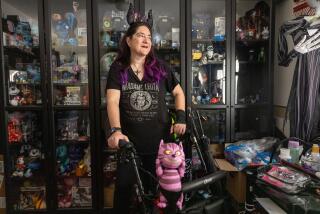Federal Rules Assailed as Denying Aid to Up to 75% of Disabled Children
WASHINGTON — Valerie Hartwell celebrated her 18th birthday at home on June 25 by watching taped movies with her boyfriend. It was the kind of normalcy, all too fleeting these days, that the young Vermont woman treasures.
Hartwell, who has cystic fibrosis, diabetes, asthma and scoliosis, has spent seven of the last 13 weeks in the hospital. A therapist beats on her chest every day with cupped hands to loosen up the mucus that gums her lungs and causes her body to be racked with coughs.
Walking up stairs leaves Hartwell winded. She missed half of her senior year in high school. About half of the children with cystic fibrosis do not live past 25.
But is she disabled?
Not Considered Disabled
The government says that she is not. At least, she is not disabled enough to receive benefits earmarked by Congress for poor and disabled persons.
Advocates for the disabled charge that Hartwell and perhaps hundreds of thousands of young people like her are being denied cash and access to health care because of antiquated and narrow regulations.
“An awful lot of children who should qualify don’t,” said Brit Harvey, president-elect of the American Academy of Pediatrics, which has joined with the American Medical Assn. to support proposed changes. “It’s terribly unfair.”
That charge has been heard in Washington recently. The House has passed a bill, to be debated by the Senate later this month, to broaden the scope of the 17-year-old program that provides cash to the disabled. And a case now before the Supreme Court could force a major revision of the aid program.
250,000 Children Aided
The federal Supplemental Security Income program provides about 250,000 disabled children with cash grants of up to $368 a month to help meet basic needs. Overall, SSI serves more than 4 million elderly, blind and disabled persons.
Perhaps more important than the cash, however, is that, in most states, recipients of SSI automatically qualify for Medicaid, the joint state-federal program of medical assistance for the poor.
Critics maintain that most disabled children--three of four, by the Mental Health Law Project’s estimate--are not receiving the assistance to which they are entitled. They charge that the program’s medical guidelines overlook the total effect of disabilities on the individual and demand a harsher standard of impairment for children than adults.
‘A Real Disgrace’
“Rigid” and “inflexible” is how Sen. John Heinz (R-Pa.) described the standards when he sponsored a bill in March for “desperately needed” reform. Said one congressional aide who has studied the program: “Truly disabled children are being denied benefits; it’s a real disgrace.”
Social Security Administration officials hotly deny that the rules are unfair or that any sizable number of youths is being excluded. Overall--children are not counted separately--more than half of those who apply eventually get benefits.
“When you see a child with a disability, that’s a tender moment,” said Louis Enoff, the deputy Social Security commissioner in charge of the program. “Anyone with any sensitivity feels sorry. We would like to give aid to all disabled kids. Unfortunately, that’s not what the SSI program was set up for.”
Monisha Smith of Compton was born with spina bifida. Her mother, Regina Miller, remembers that her spine was open and looked like a burn blister, purple and swollen.
The next day, doctors implanted a shunt in Monisha to drain fluid from her head to her stomach. As she grows, Monisha will need several operations to replace the tube.
The infant, now 11 months old, remains paralyzed below the knees; her digestive system does not function properly.
On Easter, Monisha ran a fever, vomited and was constantly drowsy. A doctor found that the tube had become blocked. A patch was shaved on Monisha’s head and a needle was stuck into the shunt to clear it. She spent a week in the hospital.
If Monisha is lucky, she might walk some day without braces. For now, instead of crawling, she scoots around on her belly. “Combat crawling,” her mother calls it.
Monisha was turned down for SSI because, her mother tartly said, “she’s not disabled.” The government has found that Monisha’s condition does not correspond to any of the 127 disabilities that would qualify her for benefits.
About 100,000 children apply for SSI disability benefits every year. Half are turned down for medical reasons.
The 127 disabilities listed by the government are highly specific. To meet the definition of mental retardation, for example, a child must have the skills of an ordinary child of less than half his age.
Those who cannot qualify for benefits this way can get on the SSI rolls if they can prove that they have a condition equal in severity to one of the 127 disabilities. Government officials say that this allows flexibility. But critics, noting that only about 13% of children receiving SSI qualify this way, maintain that the requirements are still too strict.
For adults, there is an additional way to qualify for SSI benefits--to show that their job prospects are impaired. More than one-quarter of adults who receive benefits qualify this way, and critics of the system believe that children deserve a similar opportunity.
Class-Action Suit Filed
“The exact same symptoms in adult and child lead to the adult getting on (disability rolls) and the child never getting on,” said Jonathan Stein, a Philadelphia attorney who has filed a class-action suit challenging the program that the Supreme Court has agreed to hear.
“People would be shocked to know what kinds of kids are being denied,” Stein said. Some examples:
--Angela is a 10-month-old from Sacramento who has to have fluid sucked out of her lungs daily and lacks control of her arms and legs because of a central nervous disorder. She is nearly blind and has heart and breathing problems. She acts like a newborn infant. Her twin sister, who performed marginally worse on disability tests, was declared eligible.
--One-year-old Katrina, who has a large tumor in her throat, breathes through a tube in her neck and is fed through another in her stomach. Her mother does not work so that she can stay with her daughter. Their apartment in San Diego is filthy, and a nurse reported that cockroaches crawled on Katrina’s breathing equipment.
--Roger, 2, has a fused spine that severely limits the use of his arms and permits no neck motion. “He can’t look up; he can’t turn his head; he has to bend down to pick things up; he can’t reach anything above his head,” said Tennessee legal aid attorney Donna Lefebvre. But he did not meet the disability program’s standard for musculoskeletal disorders.
“If your 10 little pieces of your body and life don’t fit my 10 little rules, you’re going to be denied,” said Christine LaVergne, a paralegal with the Legal Assistance Foundation of Chicago. “It’s cruel, and it’s especially cruel with children.”
“It’s a mess,” added Marilyn Holle, a lawyer at Protection and Advocacy, a nonprofit group based in Glendale, Calif., that lobbies for disabled persons. “These are individuals, and that’s how they should be looked at.”
Officials insist that they are already on the right track. “We do in fact ask for individual assessments,” said Enoff, the deputy Social Security commissioner. “It’s just that some of the advocates ask for more.”
“There does have to be a threshold of severity,” he added. To qualify as disabled, he said, individuals must meet a tougher standard than “they can’t do everything their peers do. This is a ridiculous example, but you can’t take a hangnail and an ingrown toenail and say: ‘I can’t work.’ ”
The Social Security Administration is already moving to change its disability standards. In mid-August, it proposed changes in the definition of mental disability. Enoff said that his office probably will add Down’s syndrome to the list of qualifying disabilities by the end of the year, and he said that other criteria are under review.
“I’m not satisfied it’s as good as it can be, but we’re working to make it better,” he said. “ . . . I think we’re doing reasonably well.”
No Quick Fixes
He added that the government might do better to make Medicaid available to more disabled children, rather than to reform SSI. “This is not a program you can make a quick fix in,” he said.
Advocates for the disabled are not impressed by the Social Security Administration’s efforts. Harvey, the incoming president of the American Academy of Pediatrics, dismissed the agency’s efforts as “minimal tinkering” and said: “The problems are too great for the kind of approach they’re using. The regulations were developed for adults and are not structured for children.”
The House already has passed legislation that would require the government to assess children according to the cumulative effects of their disabilities.
Under the legislation, young children with genetic or congenital disorders, such as cystic fibrosis, would automatically receive benefits until becoming old enough to be tested. The 12-year-old list of disabilities would be expanded.
Exception to Income Limits
The bill would establish an outreach program to publicize the changes. It would provide an exception to income limits for the parents of disabled children who receive care at home instead of being institutionalized.
The estimated cost of all the changes is $25 million a year. The Senate Finance Committee is scheduled to take up the issue this month.
And, if Congress does not act, the Supreme Court might. It has accepted for review in its 1989-90 term a class-action suit contending that all children who have applied for SSI disability benefits and been denied since at least 1983 should be entitled to a rehearing.
The suit is based on the case of Brian Zebley, now 11, who was born brain-damaged, partly paralyzed and mentally retarded. At age 4, he limped, drooled, fell down frequently and was not toilet-trained. But he lost the benefits he had been receiving for two years because he was deemed insufficiently disabled after surgery enabled him to walk better.
The U.S. 3rd Circuit Court of Appeals in Philadelphia, ruling that the agency erred in not judging disability on an individual basis, restored benefits to Zebley and declared that the national policy was illegal, violating the Social Security Act. The government appealed.
Now that she is 18, Valerie Hartwell might have a better chance of qualifying for SSI benefits. She is an adult and the standards are different.
At age 16, when she was judged by the rules for children, she fell short. On the three occasions when she was tested, she was able to exhale more air than the standard for respiratory impairment.
“They never did it when I was sick,” she said. She recently had so much trouble breathing that she spent five days tethered to an oxygen bottle in a hospital.
However, because she has reached adulthood, the standards take into account her employment prospects. She hopes she will now qualify for the SSI benefits that have been denied to her for three years.
“Nobody,” she sighed, “wants to hire somebody who’s always going to be sick.”
More to Read
Sign up for Essential California
The most important California stories and recommendations in your inbox every morning.
You may occasionally receive promotional content from the Los Angeles Times.










